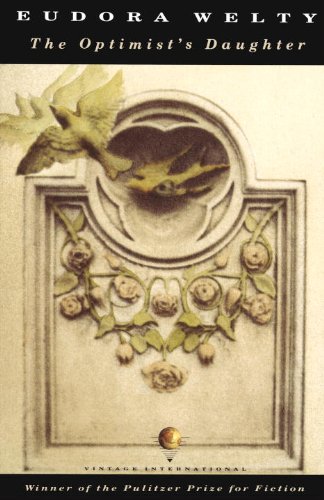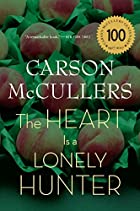
In The Optimist’s Daughter by Eudora Welty (Random House, 1972), middle-aged Laurel Hand evaluates her life and that of her childhood associates in the wake of her father’s recent death. It is a contemplative novel about relationships, life, and hopes and dreams.
At the beginning of the novel, she visits her ill father as he recovers after surgery. This first section of the slim novella gives us a glimpse into her father’s personality. He is a self-declared optimist. When he passes away, Laurel travels with her stepmother to the Mississippi hometown Laurel had not been in for many years.
Laurel’s Mississippi town has an abundance of busy-body ladies, gossip, criticism, and community and relationship politics. As Laurel experiences the funeral and discussions with her childhood friends, she feels a sense of disconnect. It is the convergence of the past with the present, memories with ideals.
The story is beautifully written and carefully crafted. I must admit that it is one of the first fiction books (for adults) that I have read in a while. I have been reading a lot of nonfiction and early chapter books. But once again, I have been blown away by the complexity of the human mind, and the ability of an author to capture the un-writable emotions that humankind experiences.
I believe that in the end, Laurel felt not only her own lack of understanding of her own father and mother and frustration at everyone else’s lack of understanding. I believe Laurel also dealt with her own ghosts. For example, Laurel finally seems to mourn her husband, who died in World War II shortly after their marriage. In the end, there is a crucial moment where Laurel realizes that she holds ideals and the characters of the people she loves up on a pedestal much as others have. She realizes, in the end, that she can continue living in the present and for the future, without dwelling on the tragedies and frustrations of the past. Maybe her father’s own optimism is finally coming through to her.
Was her father truly optimistic? Or was that just a guise for the fact that he saw the world as it really was: hypocritical?
There are plenty of emotions for Laurel to deal with as she prepares to leave her childhood home for the last time. Although I am not in the same stage of life in any way, I truly loved the complexities. I related to her frustrations at holding on to the past versus moving on. I loved her final freedom.
Memory lived not in initial possession but in the freed hands, pardoned and freed, and in the heart that can empty but fill again, in the patterns restored by dreams. (page 179)
Have you read this short (less than 200 pages) novel? What did you think it was about? Which of the multitude of characters stood out to you?



